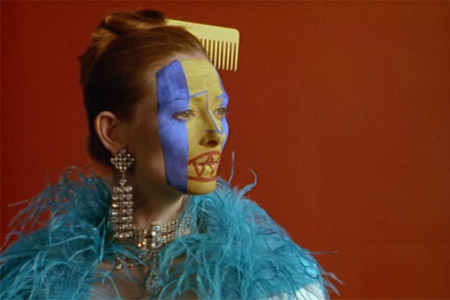British filmmaker Derek Jarman (1942-1994) was a true radical whose sensibility was formed from a rare stew: classical literature, abstract expressionist painting, punk rock, Brechtian modernism and street-level queer activism all eventually becoming vital elements of Jarman’s aesthetic and political program. As such, he inspired an entire generation of filmmakers, many of whom would come to represent the New Queer Cinema of the 1980s and ’90s. The work of Todd Haynes, Gus Van Sant, and John Greyson, among others, would be unthinkable without Jarman’s influence. (Another such artist, Isaac Julien, recently returned the favor with the 2008 documentary featurette Derek.)
At the same time, Jarman’s career might best be understood as one exemplified by disorderly brilliance and still-unrealized potential, and not just because his life was cut short by AIDS-related illness at age 52. Many of Jarman’s films are fascinating precisely because they are crisscrossed by competing influences and incompatible aesthetic tendencies, and the results are frequently uneven. Some of his best known films, such as Jubilee (1977), The Last of England (1988) and even Caravaggio (1986) are assemblies of moments, some bang-on, others slack and out of contact with the films’ apparent broader aims.
Wittgenstein’s conclusions regarding compatible and incompatible ‘language games’ might even be understood as a quasi-defense of Jarman’s own aesthetic. Our universe is comprised of clashing, mutually unintelligible idiolects. Traditional cinema smooths out the inconsistencies, whereas Jarman was content to let them ride.
This claim is not a misreading of Jarman’s Brechtian method of disjointed dramaturgy or blatant anachronism. His films, especially the later ones, employ overt anti-naturalist strategies to break the narrative flow, as well as to implore viewers to question the validity of what they are being shown. But even within that framework, Jarman’s output was often scattershot. As he grew sicker, Jarman worked with a new intensity, resulting in films that at times could seem almost deliberately incomplete, like hurried sketches. For each film that showed new focus and coherence, especially War Requiem (1989), Edward II (1991) and his final film, Blue (1993), there were others that were even more desultory.
Wittgenstein falls into that latter category. A sort of experimental biopic about the Austrian philosopher of language Ludwig Wittgenstein and a fragmentary introduction to his ideas, Wittgenstein is also an attempt to locate the body and desire as the troubling “excess” within a thought-system that, at first, would hardly seem to admit of such things. Jarman’s film at times feels like an illustrated Wikipedia page avant la lettre, and there are several touches—a querulous Martian (Nabil Shaban); Tilda Swinton’s unfortunate appearance as a damningly frivolous Lady Ottoline Morrell—that provide little aside from a variegated color palette against the black box studio setting. Major ideas pop in and out like intellectual Whack-a-Mole, but given the circumstances of Jarman’s health, it’s difficult to fault the film too heavily.
Suitably enough, Wittgenstein’s most lucid and in many cases emotionally rich moments are those depicting the seminar rooms of Cambridge. These scenes trace the crisis as Ludwig (Karl Johnson) undertakes a wholesale revision of his philosophy, from the stark, self-enclosed analytic thought of his Tractatus Logico-Philosophicus (1921) to the more socially-defined “language games” of his Philosophical Investigations (c. 1946). In the scene below, we see Ludwig’s lover/student Johnny (Kevin Collins) taking a break from his welding work to fiddle with dominos. The careful arrangement is then whisked away, as if perfect organization were hopeless. Jarman then cuts to Ludwig in bed (where he and Johnny were making love a few moments ago). He is agitated, puzzling over social pleasantries.
There are a few things we can observe about this scene. For one thing, Jarman’s primary visual metaphor for Wittgenstein’s “about face” (the rejection of the Tractatus and his turn to social meaning) is the wiping away of the dominos, which itself is something Johnny sets up as an interstitial distraction from his “real” job. (The domino play is like messing around on the Internet between data entry sets.) Furthermore, it’s only because of Wittgenstein’s insistence on the primacy of material things that Johnny has the job in the first place. Ludwig’s rival at Cambridge, “Bertie” Russell (Michael Gough) feels Johnny should be completing his “true” work in philosophical study.
However, keep in mind this irony. Johnny generates his metaphor—the erasure of order in favor of indeterminate chaos—by himself, not in a social setting. Likewise, Ludwig rehearses the very social speech acts that necessitate the Philosophical Investigations— “Yes, I’d like that very much. Yes, Wednesday. Oh, does that suit you?” etc.—all alone, in bed. (Jarman’s implication, of course, is that it is sex and relationality that brought these revelations to the fore.) And so, when Ludwig returns to the seminar room, answering the questions of Maynard Keynes (John Quentin), what he, and the film, patiently explain is that there is no such thing as private cogitation, the lone thinker plumbing his own mental depths.
Instead we have the shared habits and horizons of culture, the articulation of shared worldviews within which more basic contestations are possible. And so, in some sense, Wittgenstein’s conclusions regarding compatible and incompatible “language games” might even be understood as a quasi-defense of Jarman’s own aesthetic. Our universe is comprised of clashing, mutually unintelligible idiolects. Traditional cinema smooths out the inconsistencies, whereas Jarman was content to let them ride.




